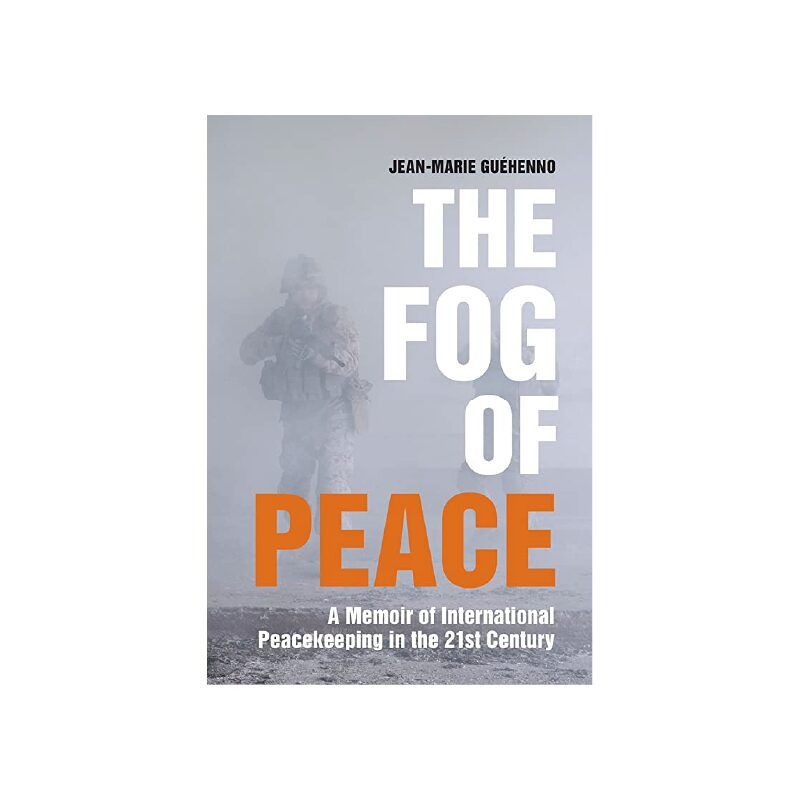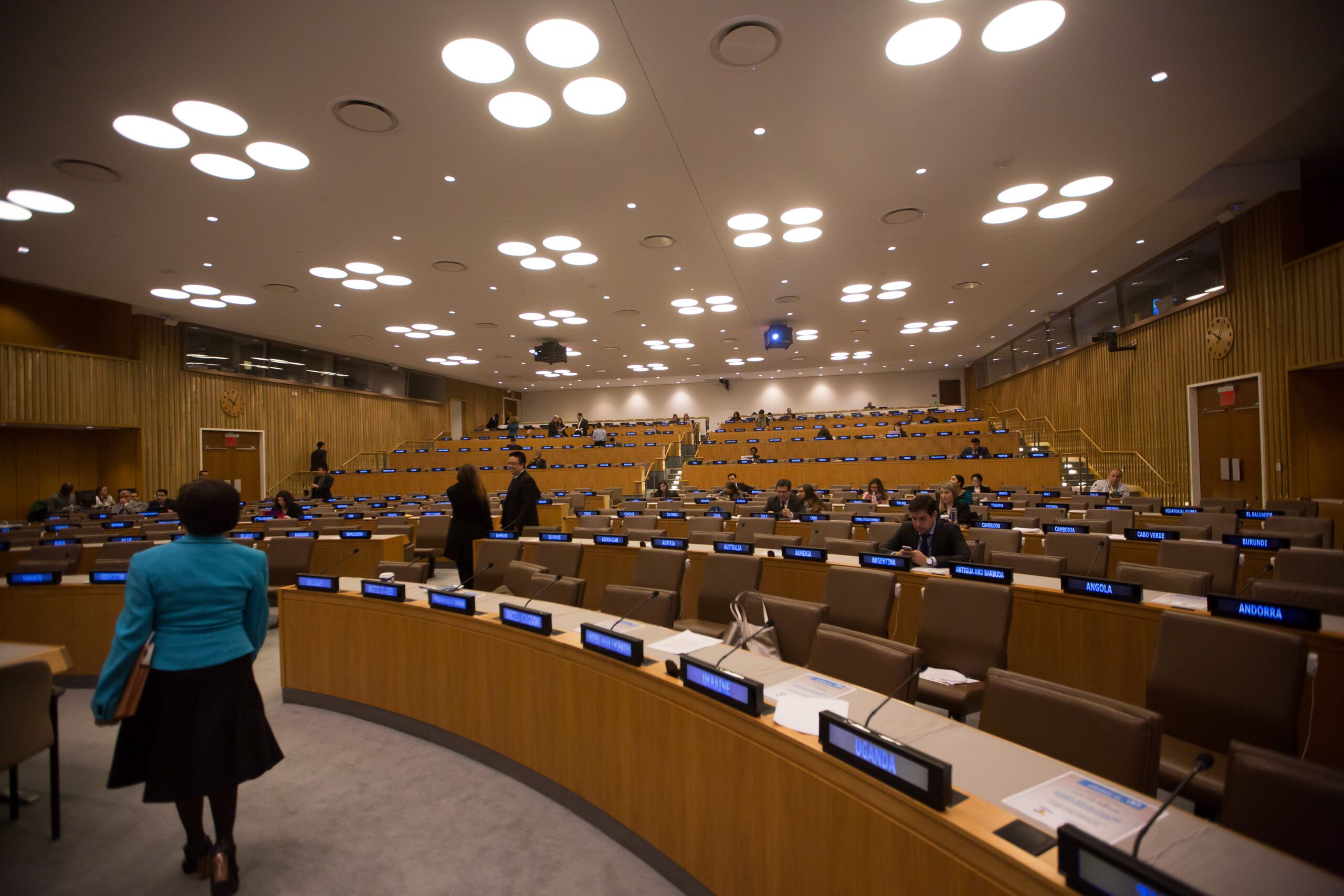When It Comes to Helping a Country in Crisis There Are Several Tools, the Most Important One Being the Most Immaterial: the Political One.
Distinguished former Under Secretary-General of Peacekeeping Operations Jean-Marie Guéhenno shares his insight on the current state of UN peacekeeping in an interview with CIC Senior Visiting Fellow Alexandra Novosseloff. Referring to analysis in his recent book The Fog of Peace: A Memoir of International Peacekeeping in the 21st Century, Guéhenno talks about the role of the P5 in peacekeeping, the challenge of adequate mandates, and necessary reforms in UN Peace Operations efforts that the next Secretary-General needs to address. The following is an edited transcript of the interview.
Alexandra Novosseloff: The Fog of Peace looks in particular at lessons learnt in peacekeeping. From your perspective of vast in-depth knowledge, first-hand involvement and experience with peacekeeping, is it fair to say that the real problem of peacekeeping is that it too often lacks “a focused political strategy” and “clarity on the degree of the support of the international community,” as you state in the book?
Jean-Marie Guéhenno: Yes. A key lesson for me in my years of running peacekeeping operations is that the Security Council and the member states focus on the hardware of troops, because that’s easily visible. However, they don’t focus enough on the politics underpinning the whole effort, because that’s much more controversial and politically sensitive. The members of the Security Council have a hard time agreeing in substance on a political strategy. I think that this can be overcome if the UN Secretariat, if the UN officials themselves, think through a political strategy. Provided that political strategy does not contradict the direct interests of one of the key members of the Security Council, the UN actually has quite a bit of leeway if it is creative and imaginative. But it is not always creative and imaginative, and so it does not always use the space it has. When you are creative, you take risks. If you take a risk and are successful, the Security Council will be happy with it and will take credit for it. But if it does not work, you will be very lonely. The resulting safe bureaucratic attitude is not to take too much initiative or risk, and therefore not to have a genuinely ambitious political strategy. Hence this focus on troops, on the hardware, on the military means to an end, and not much thinking on all the other tools or about the real political end that should be achieved.
AN: Another aspect is the fact that the mandates are maybe too ambitious. How do you balance these ambitions with the reality of UN capacities as a whole?
JMG: The mandates are not just too ambitious, they are also too broad and lacking in focus. In the Security Council negotiations leading up to writing the resolution that will define the mandate, everybody has his or her own ‘nice’ idea. So, very often, the mandate looks like a kind of Christmas tree with lots of laudable goals but no sense of priority. Since priority would again require asking some hard questions, and then answering them, that is where it gets difficult.
Another element is that the process of writing a mandate and then deploying a mission is flawed. In the Brahimi Report a two-step approach was suggested. And the latest High-level Panel on Peacekeeping [HIPPO] report advocates a staged approach to mandates. Both reports identify a key issue: producing a mandate should be a much more iterative process, because the Secretariat has to be the bridge between the Security Council − which has political authority − and the troop contributing countries [TCCs] that will provide the muscle. The various interests have to be reconciled. Currently it does not happen that way. The result is that the Security Council defines a very broad, unfocused, overambitious goal and then it says to the Secretariat, ‘over to you’. The real process should be for the Secretariat to discuss with all the stakeholders and agree on a mandate that is backed not just by the Security Council but also by those who will have the difficult task of implementation.
AN: How would a strengthened and more constructive triangular cooperation between the Secretariat, the Security Council and those troop contributing countries look? We’ve seen for example TCC meetings convened by the Secretariat that are not an appropriate venue for TCCs in particular to convey their concerns.
JMG: Well, to be invited to such a meeting you only have to contribute one officer to be considered a TCC. So you then have one country contributing maybe several battalions or a key component of the mission sitting next to a country that is just there to be informed about what’s going on. Hence there is no sense of shared responsibility. I do think that there needs to be meetings where you really sit around the table with the key actors or potential actors of a mission to discuss the operation. But a meeting in itself is just a meeting. The crucial question is whether that meeting will have consequences.
There are several issues with how you shape the military leg, so to speak, of an overall strategy. Yet again, the strategy cannot be just the military leg. The military strategy is only one component of an overall political strategy wherein military force can provide some leverage. The military strategy is important, and I would be the last one to underestimate that. But it’s only part of something broader – it is just one of the levers you have. Now there are several factors alluded to in your question. First, what capacity will be available? And capacity here means a combination of forces made available to the UN along with the willingness to use those forces in a certain way. There are many shortcomings with respect to this. You see for instance the Security Council authorizing a mission with 10,000 troops and one year later there are little more than half of those troops deployed on the ground. That is not right. When the Secretariat sees that it is not going to be able to recruit within a certain period of time at least half of what the Security Council has authorized, there should be a process to engage the Security Council and review those goals. You cannot achieve the mandate with 60% of the force that was planned. It is not credible.
You need to have a working equation between the numbers and the required tasks. It is a question of how many troops the Secretariat can recruit. What operations are the recruited troops willing and able to conduct? There must be a sufficiently detailed and frank discussion for the Secretariat to have a very clear idea of this. Writing a mandate should be an evolving process, an interaction between the Secretariat and the Security Council, and the final operational mandate should integrate all of it. The Secretariat needs to be in a position to say concerning a particular mandate, “we would have loved to do this and that, but frankly we don’t have the numbers, we don’t have the capacities, we don’t have the willingness among our troop contributors, so this is what we can do.” The ball is squarely also in the camp of the Security Council. It is too easy for the Security Council to turn to the Secretariat and assume there is some miraculous army that can be put together with no responsibility on their part.
Numbers are not the whole story though. Behind the numbers there has to be willingness, tied to an effective capacity. And that’s where we need discussion on the concept of the operation of a peacekeeping mission. Are the troops that are going to be deployed prepared to do x, or not? And not in generic terms – but concerning concrete scenarios. Are we for example prepared to deploy mobile operating bases? Are we going to complain if after six months they are not in fixed accommodations? There has to be a clear understanding of the expectations of the troops. And here I think in terms of the planning phase of the mission. I don’t think that the NATO model is necessarily the ideal, where the mission is entirely the property so to speak of the troops and the countries that are contributing them. Concerning the UN model, there is some merit to benefiting from lessons learnt, and from the experience of other missions. There is also an advantage in not making the mission the sole hostage of the troop contributing countries. A more integrated, broader perspective is what the UN is all about as a universal organization. However, I think that in the planning phase and then in the execution, officers of the main contributing countries should be involved so that they feel comfortable with the way the mission is planned and then executed. That is not a bad thing. It is all a question of balance.
The United Nations has immense institutional knowledge. It does not always do a superb job because it lacks resources. But it certainly knows a lot about stabilizing operations, and it knows more about peacekeeping than most countries individually, including countries that think of themselves as vastly superior militarily and that have much greater military capacity. That does not mean that they understand everything about peacekeeping. Sometimes there is a little bit of arrogance here.
AN: Do you think the Obama Summit will impact those current challenges concerning the lack of a sufficient number of deployable troops? And will it provide the Secretariat more options in selecting the TCCs needed in a peacekeeping operation?
JMG: The United States contributes officers and police, but it is not contributing troops to the United Nations. If it did, that might actually create problems because of the geopolitical weight of the country. At the same time, the U.S. is the UN’s number one financial contributor. That situation puts the U.S. in a delicate position with regard to peacekeeping. If it calls on other countries to contribute more troops, it can be accused of asking others to do what it does not do. But the fact that President Obama at the UN and in a memo to his administration has detailed all the things that the U.S. is willing to do for the UN sends a very good political signal. And in the end, the political support the United States gives to the United Nations is even more important than the material support.
This excellent U.S. initiative is not going to end the debate on the risks that peacekeepers should take. Troop contributors would like the countries – among them the U.S. – that ask them to take more risks, to also carry part of that burden. This is a legitimate political request, and the fact that the U.S. may provide more indirect support in terms of training, logistics, etc. is a partial answer, as would be more direct operational support in difficult environments. The Obama Peacekeeping Summit will ideally begin to address more directly and more transparently this issue of the triangular interaction between the Security Council, the troop contributing countries and the Secretariat. It will remain a problem if the P5 are not prepared to provide the backbone of peacekeeping in terms of military capacities.
This was actually the idea of the UN charter in 1945, and it was completely turned around during the Suez crisis because France and the UK were parties to the conflict. And so the great invention of Dag Hammarskjöld and Lester Pearson was to bring in troops that would be anything but the P5. For a very long time afterward, peacekeeping was anything but the P5. But some of the P5 came back during the Yugoslav war: Britain and France. Russia is involved in peacekeeping now, as is China. So now you do have the P5 in limited numbers but not totally insignificant. We are therefore presently in a situation that is neither the vision of the charter of 1945 nor the vision of the founders of peacekeeping in 1956. We have now a sort of mixed situation, in a context where it is also much riskier to be a peacekeeper today than it was 30 years ago. Because of this, we need to find intelligent ways to involve troop contributing countries more. And the P5 must open up to the troop contributing countries.
AN: In your book you talk about the relationship between the host countries and the various parties to the conflict. What are your conclusions?
JMG: Peacekeeping missions are generally deployed on the basis of the host country’s consent. But that consent needs to be managed, and sometimes it is essentially not really there. In these cases, the UN is effectively begging the host country to accept to be helped. That was the case in Sudan, in Darfur. This is not a good position to be in because the UN should never be in a position of “demandeur” when it comes to actually putting its people, its troops, at risk. I strongly believe that when you deploy troops in a country, that country is not doing you a favor – you are doing a favor for that country. You are spending blood and treasure to help. If the leadership of that country does not want you to help – and peacekeeping in itself is difficult enough – then it is going to become an almost impossible situation. So I think in many situations we see that the golden hour for the peacekeeping operation is at the beginning, when the state structures have collapsed. Then the UN – even if it does not have a mandate to run the country, as was the case when Timor became independent – is in a strong position to shape things and can help if it does so intelligently and with a clear political strategy.
AN: If you had to pick one or two major reforms that the next Secretary-General [SG] should undertake, what would those be?
JMG: I think the existing structures of the UN, with a Department of Political Affairs and a Department of Peacekeeping, are not completely adequate. Yet I do not think there is an ideal organigram. Each has its downside. So, I will not suggest that there is ‘the’ organigram that will fix the problems of the UN. But I think that the next SG certainly will have to think about how to better manage the crucial connections that exist between politics, peacekeeping and development.
When it comes to helping a country in crisis there are several tools, the most important one being the most immaterial: the political one. How are you going to enlist the support of a particular region or at least make sure that the divisions within that region are not going to make things worse? Political strategy really has to be the umbrella, the compass, of a mission. It is the key element.
Then you have different tools – but they are only tools. You have the possibility of deploying troops; you have what may be done in terms of support to governance and humanitarian challenges, because there can be a major humanitarian crisis that will also have political implications that require development tools. All of this needs to be orchestrated much better in a much greater continuum. The notion of distinct categories of peace enforcement, peacekeeping and peacebuilding is just theory. It is not reality. When and to what extent to deploy troops has to be decided on the merits of the case, and each situation has its unique characteristics. The UN is not really configured to have this kind of broad approach in terms of how it plans its actions, or to really think of all the tools it has in its toolbox and use them in a seamless manner. I think this is a reform to which much thought should be given. The traditional categories of peacekeeping and political missions do not make sense any more. The separation between the peacekeeping budget and the fact that political missions cannot be funded through peacekeeping is not useful. One should be much more flexible on that. If the international community invests in engagement in countries, it has to have the means to do it. So that is one structural issue where greater flexibility and fluidity should be built into the UN systems.
Another key issue is that the Secretary-General of the United Nations needs to have much more flexibility with an available team of highly experienced political operators that he can consult and deploy quickly. The UN needs more seasoned leaders like UN Envoy Sergio Vieira de Mello, whom we lost in Bagdad, or like Lakhdar Brahimi, who can be deployed rapidly in times of crisis. I think the way the UN currently scrambles to find the right envoy or SRSG in acute crisis situations leads to uneven results. There has to be much greater thought given to how you assemble a flexible pool of people that can help the Secretary-General deal with a world that is increasingly complicated.
Alexandra Novosseloff is Senior Visiting Fellow at the Center on International Cooperation. | Twitter: @DeSachenka
Jean-Marie Guéhenno is president of the International Crisis Group and non-resident Senior Fellow at the Brookings Institution and the Center on International Cooperation. From 2000 until 2008 he was Under Secretary-General for Peacekeeping Operations. | Twitter: @JGuehenno


